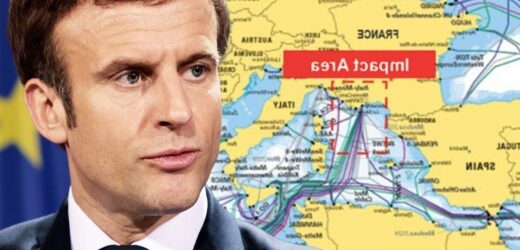Xlinks: Dave Lewis outlines plan for undersea power cable
We use your sign-up to provide content in ways you’ve consented to and to improve our understanding of you. This may include adverts from us and 3rd parties based on our understanding. You can unsubscribe at any time. More info
A major internet cable in the south of France was reportedly severed on Wednesday night, triggering internet issues across the world – and it occurred just hours within a “major incident” that left residents of the Shetland Isles off the coast of Scotland without connectivity following damage to a submarine cable. According to cloud security company Zscaler Trust, the damage to the cable in France impacted connectivity to Europe, Asia, the US and potentially other parts of the world. The incident reportedly affected three cable links: Marseille-Lyon, Marseille-Milano and Marseille-Barcelona. Zscaler reported that its “customers may see packet loss and or latency for websites and applications which traverse these impacted paths”.
While the incident has since been resolved, Zscaler CEO Jay Chaudhry has claimed that it was an “act of vandalism”.
He wrote on Linkedin: “Zscaler detected a strange traffic anomaly. From Europe to India, access to certain applications became sluggish. Latency to impacted applications spiked, but others kept on operating normally. Our investigation identified that the issues were a result of a severed fibre cable in Marseille, France. However, this fibre cut is unique for two reasons:
“1. Zscaler detected the fibre cut and posted a trust notice long before anyone else. Since Zscaler controls the network, we were able to re-route the traffic and mitigate the issue for our global users. It is interesting that, while our telco partners acknowledged the event privately, this event has not been picked up broadly, even as of this writing.
“2. This fibre cut was an act of vandalism and impacted at least three cable systems. Sitting between applications and end users with the ability to steer traffic between our data centres to influence network paths is more than just about security. “


Mr Chaudhry also that this cable that he suspects was likely targeted was a hugely important one, further raising his suspicions.
He said: “This capability provides reliability during times of uncertainty, as we have seen during the COVID-19 pandemic, as well as with natural and man-made disasters such as this one. It is a critical tool in our arsenal.
“Having visibility into global performance based on 250 billion transactions a day coming from tens of millions of users makes Zscaler a reliable and trusted partner in an uncertain world.”
This also comes after reports emerged that the French Presidency was consulting with leading experts to strengthen the security of submarine cables amid growing fears that France could be Russia’s next target, following its suspected “sabotage” of the Nord Stream 1 and 2 pipelines last month.
Chaudhry

The Blasts to Russia’s pipelines caused gas to leak out into the Baltic Sea , ripping holes in four places in an event which raised the alarm for the West. While solid evidence for who was responsible has yet to emerge, Western officials appear to agree that Russian President Vladimir Putin was the culprit.
In response to the Nord Stream incident, French President Emmanuel Macron said earlier this month: “We have essential infrastructure which is beyond our territory: cables, satellites and oil and gas pipelines. We’ve been reinforcing their security since the start of the war.”
France’s 2023 budget also includes €3.1million (£2.7million) for “ocean floor” defence, while the French Presidency has also set up an undersea cables “task force” following the Nord Stream leaks, Politico reports.
The West has long been aware of the vulnerability of the subsea cables, which are pivotal for global communication infrastructure and account for around 95 percent of all transatlantic data traffic, according to the International Cable Protection Committee.
DON’T MISS
Putin’s energy threat backfires as Russia to bow to China [INSIGHT]
Truss handed ‘quick and cheap’ energy goldmine to power ‘millions’ [REVEAL]
Elon Musk’s UK rival crashes rocket in sea after Iceland test fails [REPORT]


However, experts have warned that defences are currently somewhat meagre, leaving the 530 active or planned submarine cables seriously at risk.
While the damage to the south subsea cable off the Shetland Isles was believed to be caused accidentally by a fishing vessel, the fact that there were two incidents in one day has also raised suspicions.
Brandon Weichert, a geopolitical analyst and former Congressional staff member, exclusively told Express.co.uk following the Shetlands incident: “Officially, it [the cut cable] is believed to have been [done by] a fisherman. Although, even as that story indicates, two points of damage at two different areas along the cable track is strange.
Source: Read Full Article


